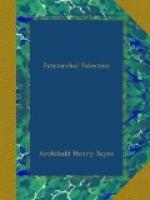The Babylonian army had been defeated near Damascus, and immediately after this we are told that the steward of Abraham’s house was “Eli-ezer of Damascus.” Whether there is any connection between the two facts we cannot say; but it may be that Eli-ezer had attached himself to the Hebrew conqueror when he was returning “from the slaughter of Chedor-laomer.” The name of Eli-ezer, “God is a help,” is characteristic of Damascus. More often in place of El, “God,” we have Hadad, the supreme deity of Syria; but just as among the Israelites Eli-akim and Jeho-iakim are equivalent, so among the Aramaeans of Syria were Eli-ezer and Hadad-ezer. Hadad-ezer, it will be remembered, was the king of Zobah who was overthrown by David.
Sarai, the wife of Abraham, was still childless, but the patriarch had a son by his Egyptian handmaid, the ancestor of the Ishmaelite tribes who spread from the frontier of Egypt to Mecca in Central Arabia. It was when Ishmael was thirteen years of age that the covenant was made between God and Abraham which was sealed with the institution of circumcision. Circumcision had been practised in Egypt from the earliest days of its history; henceforth it also distinguished all those who claimed Abraham as their forefather. With circumcision Abraham received the name by which he was henceforth to be known; he ceased to be Abram, the Hebrew from Babylonia, and became Abraham the father of Ishmael and Israel. The new rite and the new name were alike the seal and token of the covenant established between the patriarch and his God: God promised that his seed should multiply, and that the land of Canaan should be given as an everlasting possession, while Abraham and his offspring were called upon to keep God’s covenant for ever.
It could not have been long after this that the cities of the plain were destroyed “with brimstone and fire from the Lord out of heaven.” The expression is found in the cuneiform tablets of Babylonia. Old Sumerian hymns spoke of a “rain of stones and fire,” though the stones may have been hail-stones and thunderbolts, and the fire the flash of the lightning. But whatever may have been the nature of the sheet of flame which enveloped the guilty cities of the plain and set on fire the naphtha-springs that oozed out of it, the remembrance of the catastrophe survived to distant ages. The prophets of Israel and Judah still refer to the overthrow of Sodom and its sister cities, and St. Jude points to them as “suffering the vengeance of eternal fire.” Some scholars have seen an allusion to their overthrow in the tradition of the Phoenicians which brought their ancestors into the coastlands of Canaan in consequence of an earth-quake on the shores of “the Assyrian Lake.” But the lake is more probably to be looked for in the neighbourhood of the Persian Gulf than in the valley of the Jordan.




